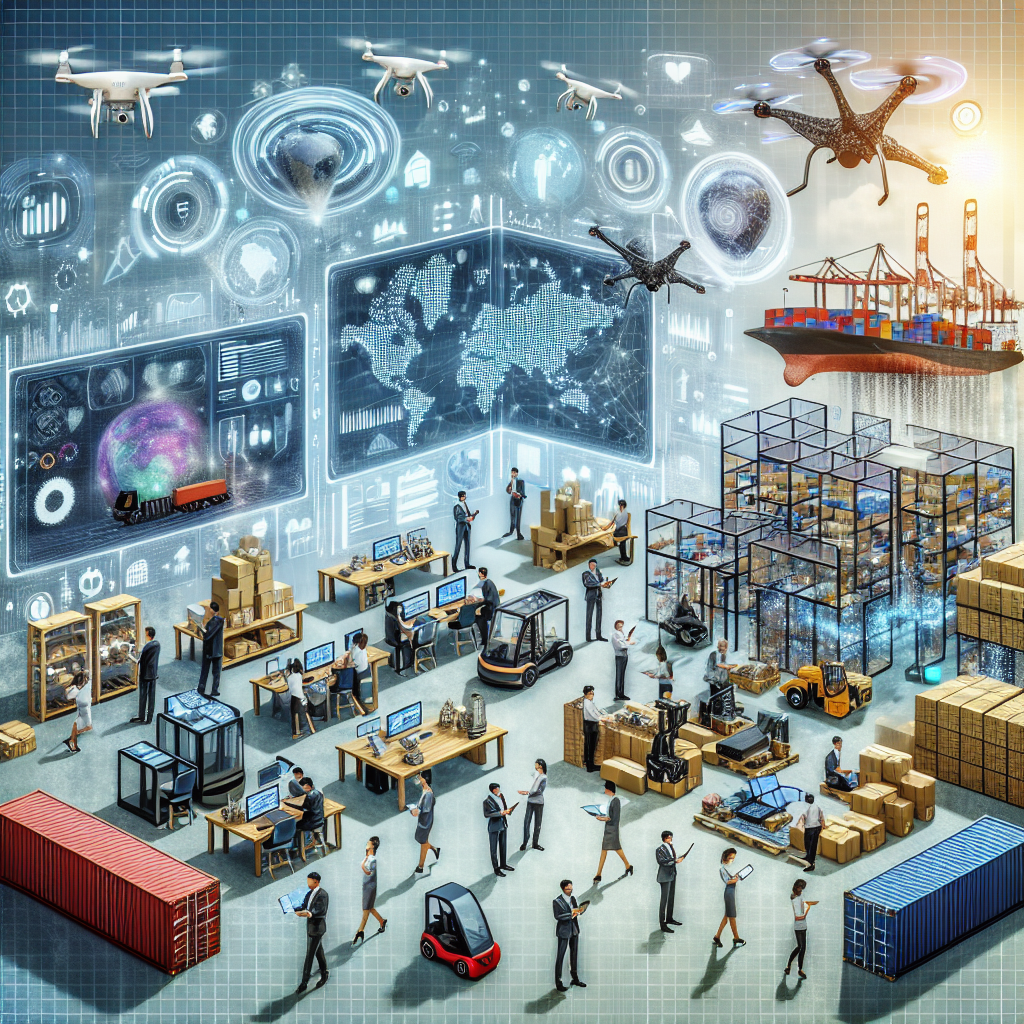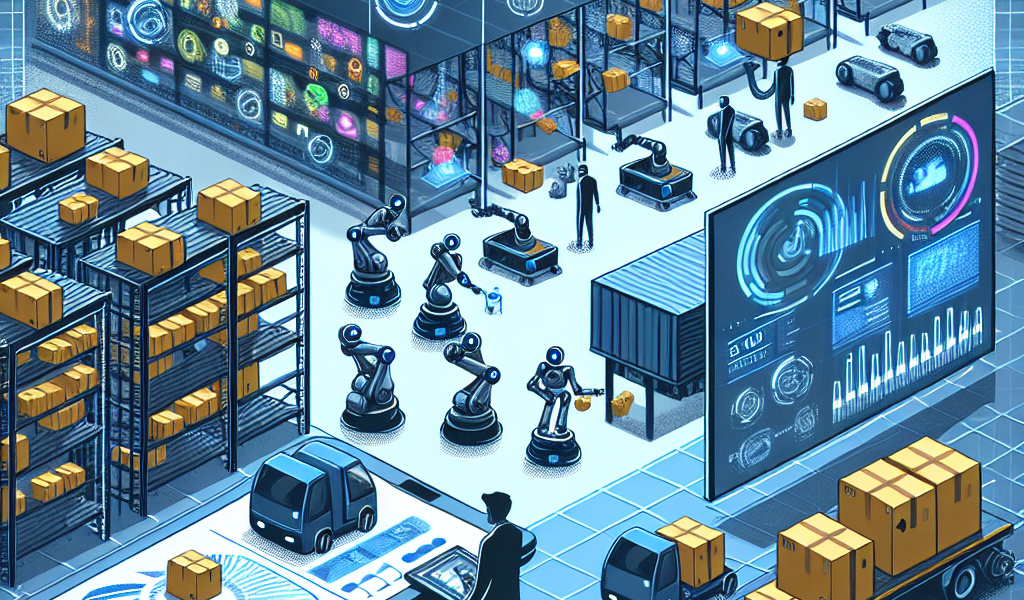-
Table of Contents
“Streamlining Supply Chains: Harnessing Technology for Unmatched Efficiency”
Introduction

The integration of advanced technology into supply chain management is revolutionizing the way businesses operate, driving unprecedented levels of efficiency and productivity. Innovations such as artificial intelligence (AI), the Internet of Things (IoT), blockchain, and big data analytics are transforming traditional supply chain processes, enabling real-time tracking, predictive analytics, and enhanced transparency. These technologies facilitate better decision-making, reduce operational costs, and improve overall supply chain resilience. By automating routine tasks, optimizing logistics, and providing deeper insights into supply chain dynamics, tech advancements are not only streamlining operations but also paving the way for more agile and responsive supply chains. As a result, companies can better meet customer demands, manage risks, and maintain a competitive edge in an increasingly complex global market.
Leveraging Artificial Intelligence for Predictive Analytics in Supply Chains
In the ever-evolving landscape of global commerce, supply chains are the lifeblood that keeps goods flowing from manufacturers to consumers. However, the complexity and scale of modern supply chains present significant challenges, from managing inventory levels to predicting demand fluctuations. Enter artificial intelligence (AI), a transformative technology that is revolutionizing supply chain management through predictive analytics. By leveraging AI, companies can not only anticipate future trends but also make more informed decisions, ultimately enhancing efficiency and reducing costs.
One of the most compelling advantages of AI in supply chains is its ability to process vast amounts of data at unprecedented speeds. Traditional methods of data analysis often fall short when dealing with the sheer volume and variety of information generated in today’s interconnected world. AI algorithms, however, can sift through this data, identifying patterns and correlations that would be impossible for human analysts to detect. This capability allows businesses to forecast demand with remarkable accuracy, ensuring that they can meet customer needs without overstocking or understocking products.
Moreover, AI-driven predictive analytics can help companies navigate the uncertainties that often plague supply chains. For instance, natural disasters, political instability, and sudden shifts in consumer behavior can all disrupt the flow of goods. By analyzing historical data and real-time information, AI can provide early warnings about potential disruptions, enabling companies to take proactive measures. This foresight is invaluable in maintaining the resilience and agility of supply chains, particularly in an era where unexpected events are becoming increasingly common.
In addition to predicting demand and mitigating risks, AI can also optimize various aspects of supply chain operations. For example, machine learning algorithms can analyze transportation routes and schedules to identify the most efficient paths for delivery. This not only reduces transit times but also minimizes fuel consumption and carbon emissions, contributing to more sustainable business practices. Furthermore, AI can enhance warehouse management by predicting which products are likely to be in high demand and ensuring they are readily accessible, thereby speeding up order fulfillment.
The benefits of AI in supply chains extend beyond operational efficiencies. By providing deeper insights into consumer preferences and market trends, AI enables companies to tailor their offerings more precisely to customer needs. This level of personalization can lead to increased customer satisfaction and loyalty, which are crucial for long-term business success. Additionally, the ability to anticipate market shifts allows companies to stay ahead of competitors, positioning them as leaders in their respective industries.
However, the integration of AI into supply chains is not without its challenges. Implementing AI technologies requires significant investment in both hardware and software, as well as the development of specialized skills among employees. Moreover, the reliance on data raises concerns about privacy and security, necessitating robust measures to protect sensitive information. Despite these hurdles, the potential rewards of AI-driven predictive analytics make it a worthwhile endeavor for forward-thinking companies.
In conclusion, artificial intelligence is proving to be a game-changer in the realm of supply chain management. By harnessing the power of predictive analytics, businesses can achieve greater efficiency, resilience, and customer satisfaction. While the journey to fully integrating AI into supply chains may be fraught with challenges, the transformative impact of this technology is undeniable. As companies continue to embrace AI, the future of supply chain management looks not only more efficient but also more responsive to the ever-changing demands of the global market.
The Role of Blockchain in Enhancing Supply Chain Transparency
In an era where efficiency and transparency are paramount, the supply chain industry is undergoing a transformative shift, largely driven by technological advancements. Among these innovations, blockchain technology stands out as a game-changer, promising to enhance supply chain transparency in ways previously unimaginable. As companies grapple with the complexities of global trade, blockchain offers a beacon of hope, ensuring that every step of the supply chain is visible, verifiable, and secure.
Blockchain, often associated with cryptocurrencies, is essentially a decentralized ledger that records transactions across multiple computers. This decentralized nature ensures that no single entity has control over the entire chain, making it inherently secure and resistant to tampering. For the supply chain industry, this means that every transaction, from the procurement of raw materials to the delivery of the final product, can be recorded in a transparent and immutable manner.
One of the most significant advantages of blockchain in the supply chain is its ability to provide real-time visibility. Traditionally, supply chains have been plagued by a lack of transparency, with information often siloed within different departments or organizations. This fragmentation can lead to inefficiencies, delays, and even fraud. However, with blockchain, every participant in the supply chain can access a single, unified source of truth. This real-time visibility ensures that all parties are on the same page, reducing misunderstandings and streamlining operations.
Moreover, blockchain’s immutable nature means that once a transaction is recorded, it cannot be altered. This feature is particularly beneficial in combating fraud and ensuring the authenticity of products. For instance, in the pharmaceutical industry, counterfeit drugs are a significant concern. By using blockchain, companies can track the journey of a drug from the manufacturer to the end consumer, ensuring that it has not been tampered with or replaced with a counterfeit product. This level of traceability not only enhances consumer trust but also ensures compliance with regulatory standards.
In addition to combating fraud, blockchain can also improve accountability within the supply chain. Every transaction recorded on the blockchain is time-stamped and linked to a specific participant. This means that in the event of a dispute or issue, it is easy to trace back and identify the responsible party. This level of accountability can drive better business practices and foster a culture of responsibility and transparency.
Furthermore, blockchain can streamline administrative processes, reducing the need for intermediaries and paperwork. Smart contracts, which are self-executing contracts with the terms directly written into code, can automate various aspects of the supply chain. For example, payments can be automatically released once certain conditions are met, such as the delivery of goods. This automation not only speeds up transactions but also reduces the potential for human error and disputes.
While the benefits of blockchain in the supply chain are clear, it is essential to acknowledge the challenges that come with its implementation. Integrating blockchain into existing systems can be complex and requires significant investment in terms of time and resources. Additionally, there is a need for industry-wide standards and collaboration to ensure that blockchain solutions are interoperable and widely adopted.
Despite these challenges, the potential of blockchain to revolutionize the supply chain is undeniable. As more companies recognize the value of transparency and efficiency, the adoption of blockchain is likely to accelerate. In a world where consumers are increasingly demanding transparency and accountability, blockchain offers a promising solution, ensuring that the supply chain of the future is not only efficient but also trustworthy.
IoT Integration: Revolutionizing Real-Time Supply Chain Monitoring
In an era where efficiency and precision are paramount, the integration of the Internet of Things (IoT) into supply chain management is nothing short of revolutionary. This technological advancement is transforming how businesses monitor and manage their supply chains in real-time, offering unprecedented levels of visibility and control. As companies strive to meet the ever-increasing demands of consumers, IoT integration is emerging as a critical tool in enhancing supply chain efficiency.
At the heart of this transformation is the ability of IoT devices to collect and transmit data instantaneously. Sensors embedded in various points of the supply chain—from manufacturing plants to delivery trucks—provide real-time updates on the status of goods. This constant stream of information allows companies to monitor conditions such as temperature, humidity, and location, ensuring that products are stored and transported under optimal conditions. For instance, in the pharmaceutical industry, where the integrity of temperature-sensitive drugs is crucial, IoT sensors can alert managers to any deviations from the required temperature range, enabling immediate corrective actions.
Moreover, the real-time data provided by IoT devices facilitates proactive decision-making. Instead of reacting to issues after they occur, companies can anticipate potential problems and address them before they escalate. This predictive capability is particularly beneficial in managing inventory levels. By analyzing data on sales trends and stock levels, businesses can forecast demand more accurately and adjust their inventory accordingly. This not only reduces the risk of stockouts and overstocking but also minimizes storage costs and waste.
In addition to improving inventory management, IoT integration enhances the transparency and traceability of the supply chain. Consumers today are increasingly concerned about the origins and journey of the products they purchase. IoT technology enables companies to provide detailed information about the entire supply chain process, from raw material sourcing to final delivery. This level of transparency not only builds consumer trust but also helps companies comply with regulatory requirements and ethical standards.
Furthermore, the integration of IoT in supply chain management fosters better collaboration among stakeholders. Real-time data sharing ensures that all parties involved—from suppliers to retailers—are on the same page, reducing the likelihood of miscommunication and delays. For example, if a shipment is delayed due to unforeseen circumstances, IoT devices can immediately notify all relevant parties, allowing them to adjust their plans accordingly. This seamless communication streamlines operations and enhances overall efficiency.
However, the adoption of IoT technology in supply chain management is not without its challenges. The sheer volume of data generated by IoT devices can be overwhelming, necessitating robust data management and analytics systems. Additionally, concerns about data security and privacy must be addressed to protect sensitive information from cyber threats. Despite these challenges, the benefits of IoT integration far outweigh the potential drawbacks, making it a worthwhile investment for forward-thinking companies.
In conclusion, the integration of IoT technology is revolutionizing real-time supply chain monitoring, offering significant improvements in efficiency, transparency, and collaboration. By providing real-time data and predictive insights, IoT devices enable companies to make informed decisions, optimize inventory management, and enhance consumer trust. As businesses continue to navigate the complexities of the modern supply chain, the adoption of IoT technology will undoubtedly play a crucial role in driving future success.
Conclusion
Tech is significantly enhancing supply chain efficiency by integrating advanced technologies such as artificial intelligence, blockchain, and the Internet of Things (IoT). These innovations enable real-time tracking, predictive analytics, and enhanced transparency, leading to optimized inventory management, reduced operational costs, and improved decision-making processes. Consequently, businesses can respond more swiftly to market demands, mitigate risks, and achieve greater overall efficiency in their supply chain operations.





